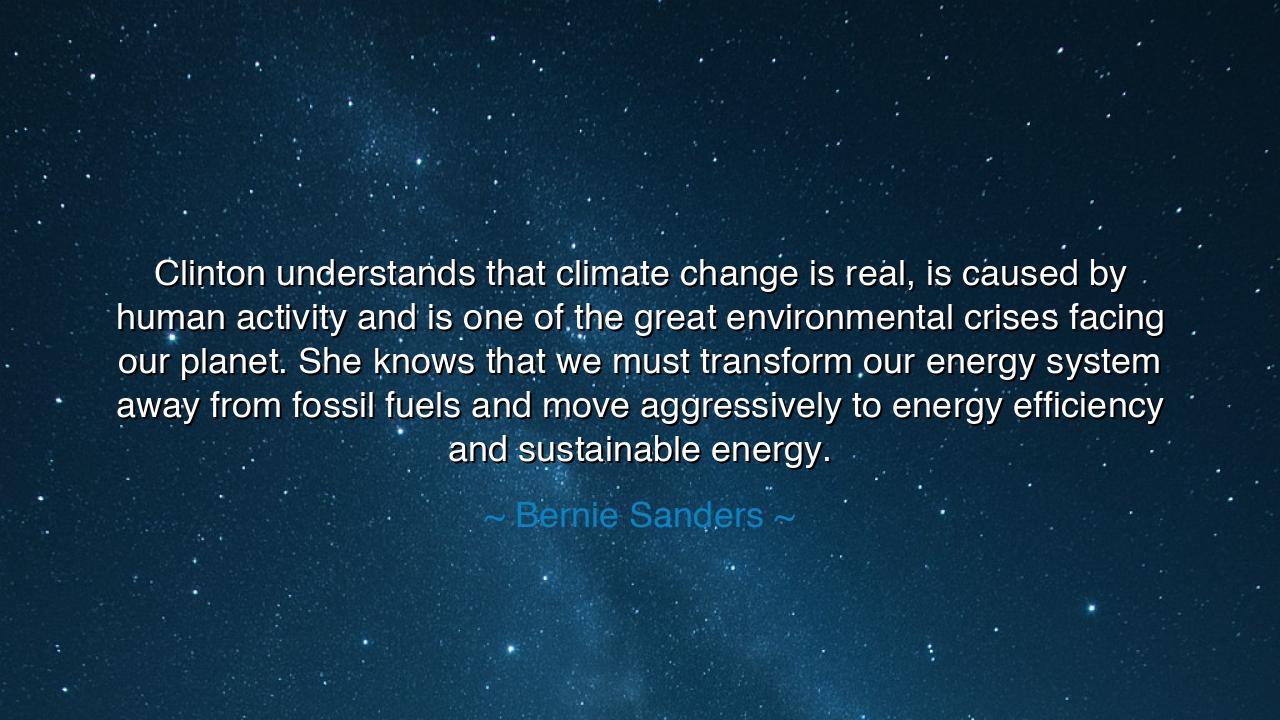
Clinton understands that climate change is real, is caused by
Clinton understands that climate change is real, is caused by human activity and is one of the great environmental crises facing our planet. She knows that we must transform our energy system away from fossil fuels and move aggressively to energy efficiency and sustainable energy.






In the fervent words of Bernie Sanders, we hear both a warning and a summons to courage: “Clinton understands that climate change is real, is caused by human activity and is one of the great environmental crises facing our planet. She knows that we must transform our energy system away from fossil fuels and move aggressively to energy efficiency and sustainable energy.” These words, though born of politics, rise beyond it. They are a call to conscience — an appeal to reason, morality, and the ancient duty of humankind to safeguard the earth that gives it life. For climate change, as Sanders declares, is not merely an issue of science, but a test of civilization’s soul — whether we will continue the path of greed and ignorance, or rise into wisdom and stewardship.
From the earliest days of humanity, our ancestors lived in balance with nature. They took what they needed and offered reverence in return — to the wind that carried the seeds, to the river that quenched their thirst, to the sun that gave life to the harvest. But in the age of industry, we forgot these sacred covenants. We burned the earth’s hidden treasures — fossil fuels buried deep as if meant to rest — and in doing so, released both light and destruction. Our cities grew bright, but the skies grew dim with smoke. The rivers choked with the ashes of progress. And now, as the planet warms, the storms grow wilder, the seas rise higher, and the forests burn with the fire of warning. Sanders’s words remind us that the time for ignorance has passed; to deny this truth is to betray the generations yet unborn.
When he speaks of transforming our energy system, Sanders calls upon the same revolutionary spirit that has moved humankind through every great turning of history. The shift from slavery to freedom, from tyranny to democracy, from superstition to knowledge — each demanded courage and sacrifice. So too does the transformation from fossil fuel dependency to sustainable energy. The ancients would have understood this struggle as one between short-term desire and eternal harmony. To build a world rooted in energy efficiency and renewable power is not simply a technical task; it is a moral awakening — to live no longer as conquerors of nature, but as her partners.
History offers us lessons of both folly and redemption. Consider the tale of the island of Easter, whose people, long ago, cut down every tree in pursuit of monuments to their glory. When the forests were gone, the soil eroded, the birds vanished, and their civilization crumbled into dust. Theirs was a tragedy of shortsightedness — a warning to all who place pride above preservation. Yet humanity has also shown its capacity for renewal. In recent times, nations that once relied on coal have turned to the power of the wind and the sun; cities have risen from pollution to green rebirth. These examples, like the phoenix of legend, show that even from ruin, the will to change can ignite new life.
Bernie Sanders speaks here not only of political vision, but of the ancient moral duty of leadership — to see beyond one’s own lifetime. To act against climate change is to act in defense of the children of tomorrow, the waters they will drink, the fields they will till, the air they will breathe. It is to remember that we are not the owners of this world, but its temporary guardians. Those who hold power — in government, in business, in daily life — must recognize that stewardship is not optional. The energy transition he describes is not simply a matter of economics; it is the renewal of our covenant with creation.
There is a quiet heroism in this vision — not the kind that wins wars, but the kind that sustains peace. To move aggressively toward sustainable energy means to reimagine entire systems, to challenge the powerful industries of oil and coal, to invest in innovation, and to believe that change, though slow, is possible. It is the same kind of heroism that once built the cathedrals, sailed uncharted seas, and reached for the stars — an act of faith in humanity’s higher nature. It demands perseverance, collaboration, and the humility to admit that we have erred, yet the strength to begin again.
Let this, then, be the teaching carried forward: the Earth is not endless, and time is not infinite. Each act of consumption is a choice between destruction and renewal. Each policy, each invention, each human decision carries the weight of the future. If we heed Sanders’s call, we will become the generation that turned from waste to wisdom, from fire to light. But if we refuse, the cost will be measured not in politics or profit, but in the silence of vanishing forests and the emptiness of poisoned seas.
And so, my children of the new century, remember this truth: to preserve the Earth is to preserve ourselves. Let your hands build, your minds imagine, and your hearts protect. The task before us is vast, yet so too is our potential. Let the flame of sustainability become the new torch of civilization — one that burns not with destruction, but with hope. For in serving the planet, we serve all life, and in doing so, we prove worthy of the world that has long sustained us.






AAdministratorAdministrator
Welcome, honored guests. Please leave a comment, we will respond soon